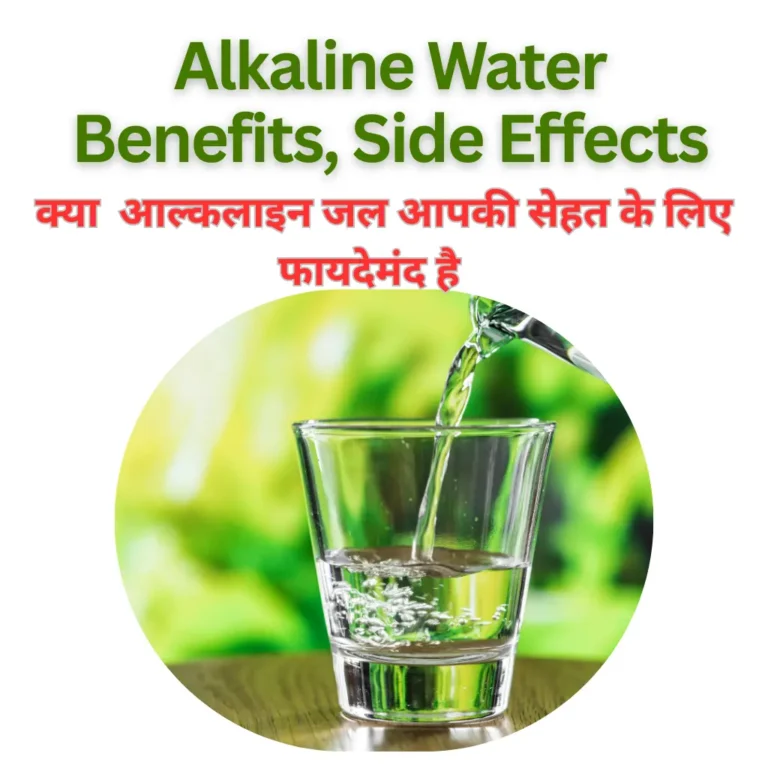Alkaline Water: Benefits, Side Effects
Water is the foundation of life, but not all water is created equal. In recent years, alkaline water has become a global wellness trend, with celebrities, athletes, and health coaches swearing by its benefits. Proponents claim it helps fight acidity, slows aging, and boosts energy. But is alkaline water truly a miracle drink—or just an expensive fad? In this article, we’ll break down the benefits, side effects, and dangers of alkaline water, backed by science, Ayurveda, and real-life examples.
What is Alkaline Water?
Alkaline water is simply water that has a higher pH level than regular drinking water. While normal tap water has a neutral pH of about 7, alkaline water typically measures between pH 8 and 9.
How It’s Made
- Natural Sources – Passing through rocks, water absorbs minerals like calcium, magnesium, and potassium, becoming alkaline.
- Artificial Methods – Using water ionizers or alkaline drops to raise the pH level.
Why pH Matters
Our body naturally maintains a pH balance, but modern lifestyles (stress, junk food, pollution) often create excess acidity. This can lead to fatigue, indigestion, and inflammation. Alkaline water claims to restore this balance.
Benefits of Alkaline Water
Improves Digestion & Reduces Acidity
One of the most common reasons people try alkaline water is acid reflux. A study in the Annals of Otology, Rhinology & Laryngology (2012) found that alkaline water with a pH of 8.8 helped deactivate pepsin, the enzyme responsible for acid reflux.
Case Study: Ramesh, a 42-year-old businessman from Delhi, suffered from chronic acidity. After switching to alkaline matka water (pH 8–8.5), his symptoms reduced within 3 weeks. His doctor confirmed reduced dependency on antacids.
Boosts Energy and Hydration
Alkaline water molecules are smaller (micro-clustered), making them easier to absorb. Athletes often report faster recovery and sustained hydration.
Real Example: During the 2020 Tokyo Olympics, several athletes publicly endorsed alkaline or mineralized water for recovery, citing reduced muscle cramps and faster performance recovery.
Strengthens Bones
A study published in Bone journal (2009) showed that alkaline water reduced bone resorption (breakdown), meaning it could support bone health in the long run.
Rich in Minerals
When sourced naturally (like from a clay matka or spring), alkaline water contains calcium, magnesium, and potassium—essential for strong bones, better digestion, and heart health.
Supports Skin Health
Antioxidants in alkaline water help fight free radicals. Regular drinkers report fewer breakouts, improved hydration, and slower signs of aging.
Side Effects of Alkaline Water
While alkaline water has benefits, too much of a good thing can be harmful.
Over-Alkalinity (Metabolic Alkalosis)
Drinking excessive alkaline water (especially ionized/chemically treated) can upset the body’s natural pH, leading to:
- Nausea
- Muscle twitching
- Hand tremors
- Confusion
Reduced Stomach Acidity
Stomach acid is crucial for digesting food and killing harmful bacteria. Long-term use of alkaline water may reduce stomach acid, causing indigestion or nutrient absorption issues.
Cost & Accessibility
Packaged alkaline water (like black water) is expensive—₹200–₹400 per bottle in India. Not eco-friendly either, since it often comes in plastic bottles.
Dangers of Alkaline Water
Artificially Ionized Water
Many commercial brands use machines or chemicals to artificially raise pH. Unlike natural matka or spring water, these may lack minerals and even harm kidney health.
Kidney Patients Beware
People with kidney disorders should avoid high-mineral alkaline water, as it may put extra load on kidneys.
False Marketing Claims
Some brands claim alkaline water cures cancer or reverses aging. There’s no solid scientific evidence for such extreme claims.
Read this blog what ayurveda Say Matka vs Black Water: Which Alkaline Water Is Best for Health?
Ayurveda’s Perspective on Alkaline Water
Ayurveda has promoted matka water for centuries. Storing water in a clay pot naturally balances pH, cools water, and adds essential minerals. Unlike artificial alkaline water, matka water is affordable, sustainable, and safe for daily use.
Key Takeaways
- Drink in moderation – 1–2 glasses daily is enough for beginners.
- Prefer natural alkaline sources – matka, spring water, mineral-rich sources.
- Avoid chemical/ionizer water for long-term use.
- Balance is key – too much alkalinity can harm digestion.
FAQs
Can I drink alkaline water daily?
Yes, but limit to 1–2 glasses a day initially. Too much may disturb digestion.
Is alkaline water safe for kids?
Matka water is safe, but avoid packaged black water for children.
Can alkaline water cure acidity permanently?
It can reduce symptoms but should be combined with a healthy diet.
Which is better: Matka water or Black water?
Matka water is natural, eco-friendly, and affordable. Black water is mineral-rich but costly.
Are there any people who should avoid alkaline water?
Yes, kidney patients or those with chronic medical conditions should consult their doctor first.
** Note:This article is written for educational purposes based on Ayurvedic principles and traditional texts. For proper diagnosis and personalized treatment, please consult a qualified Ayurvedic practitioner or healthcare professional.
Ayurvedic Doctor | 15+ Years Experience | General Physician and Panchakarma Specialist
 Dr. Dinesh Kumar is a qualified Ayurvedic doctor with over 15 years of experience in holistic physician and Panchakarma therapies. He specializes in natural treatments for skin, orthopedic, and lifestyle-related issues.
Dr. Dinesh Kumar is a qualified Ayurvedic doctor with over 15 years of experience in holistic physician and Panchakarma therapies. He specializes in natural treatments for skin, orthopedic, and lifestyle-related issues.
Clinic: Devkalp Ayurveda | Website: devkalpayurveda.com Youtube: Online Practical Tutorial
Some Important Related Link
-
You can also read this Matka vs Black Water: Which Alkaline Water Is Best for Health?”
-
“For related , check our article on Benefits of Walking 10,000 Steps a Day”
-
“If you want know about natural brain tonic, see our post on Natural Brain Tonic.”


